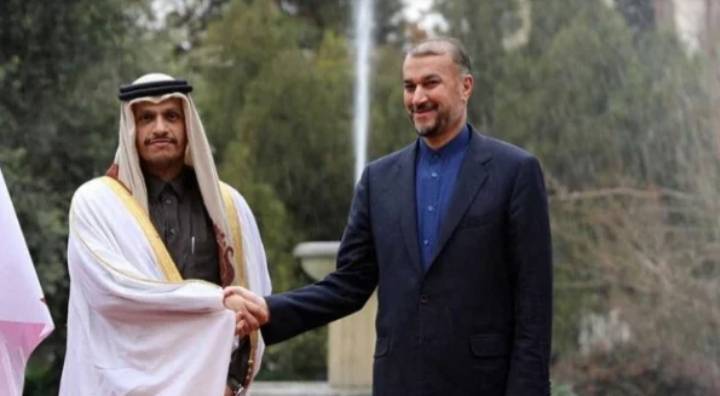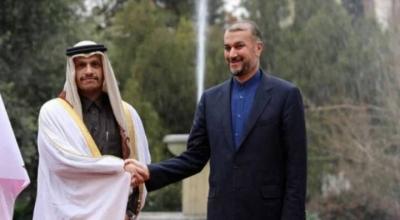There is no doubt that discussing the possibility of electing a president through only Lebanese means and tools has become impossible. The talk of the independence of the major parliamentary blocs to achieve this electoral entitlement is mere illusions that no one believes. Therefore, various scenarios have emerged regarding external mediation. With the mechanism used by the "five ambassadors" having been ruled out, attention has turned to one of two possibilities: will Saudi-Iranian dialogue take precedence, or will it be American-Iranian dialogue? Who will have the priority?
In diplomatic circles, there is serious talk about how to prompt the Lebanese to adopt a more realistic approach to the presidential elections, as international fears far exceed the concerns of some Lebanese about the negative repercussions of the delay in filling the presidential vacancy. Some Lebanese are caught in their illusions, seeking support for their views and striving to endorse this or that from the vague list of presidential candidates, including the names of hidden candidates seeking to participate in the race for the vacated palace since November 1, without the ability to predict when the elections will take place. No matter how long the wait, there is no one capable of removing the obstacles that prevent the parliament from functioning as an electoral body until the new president is elected and before undertaking any other tasks.
Given this background, diplomats and many Lebanese observers are wary of the potential negative ramifications stemming from the ongoing dispute over certain steps that avoid discussing the necessity of filling the presidential vacancy. They suggest that the form, content, and timing of these steps imply an intention to manage the vacancy in the coming period, as if the matter is postponed indefinitely. Compounding the issues further, many of the current events intensify the fears of what is to come amid conflicting plans and steps that have mobilized all administrative, political, and even judicial resources. Should some of them consider using military and security forces, they would not hesitate to embark on such a dangerous adventure.
Those in the know do not hesitate to interpret these expectations as reflective of fears stemming from a series of security reports indicating the potential emergence of unrest from unforeseen places. The economic and social crisis, coupled with the loss of fundamental means of living in certain areas, creates a suitable ground for such abnormal practices, especially in a context where some parties have not shied away from exploiting any event, regardless of its nature or size, to divert attention from their criminal actions, personal as they may be, or to achieve objectives for other external or internal parties that do not serve their community, regardless of the consequences.
In light of these concerns, observers have paused to consider the ongoing regional and international movements, the chapters of which remain incomplete, in search of a position for the so-called Lebanese file presented at international tables, which has prompted discussions on what can be done recently. While the bets placed on the "five-way meeting" necessitated caution, the planned steps proceed under the guidance of "turtle diplomacy," the outcomes of which are difficult to estimate amid misleading information circulating in some candidate circles regarding deep divisions among candidates, while downplaying leaked sources from this group suggesting they have not addressed names; their concern is to create a conceptual outline for the upcoming phase and the "qualities" of the desired president since the final task of reaching a selection phase lies with the Lebanese themselves.
Consequently, attention has turned to the diplomatic activity occurring in Damascus, where a number of Arab and Gulf diplomats have gathered for various reasons, primarily the humanitarian, rather than political, aspect of solidarity with the Syrian people in the wake of the earthquake that struck extensive residential areas, leading to more casualties and destruction than what the 12-year war has inflicted. All of this aims to imply that any political breakthroughs in relations between these capitals and Syria cannot happen without the knowledge or agreement of the Iranian side, which ultimately conditions what could arise from the Saudi-Iranian dialogue still stalled at the limited breakthroughs achieved in Yemen, contingent upon steps expected of Yemen's parties that remain hesitant or unable to take.
Thus, diplomatic references acknowledge that Lebanon's visible inability and failure to make any decisions invites both the Arab and Western worlds to support it, resembling the Yemeni paralysis manifested in the freezing of many steps beyond renewing ceasefire agreements between feuding parties and exchanging prisoners and detainees, without the mediation of the UN or Arab and international envoys successfully reviving any agreements previously made across various capitals, especially the "Riyadh Agreement," which outlined a roadmap for internal reconciliation after redistributing positions and interests to ensure the intended resolutions from these initiatives, none of which have come to fruition. It was hoped that President Abdrabbuh Mansur Hadi's resignation, which posed a challenge to various factions in Yemen, would yield fruitful results; however, the formation of the new leadership council has yet to fulfill its purpose.
In light of these observations, no positive developments or potential outcomes are anticipated from the stalled American-Iranian dialogue. Most of those who led initiatives toward Tehran have retreated, one country and envoy after another. Following the recent disconnection of the lines between the EU and Paris with Tehran in the wake of negotiations with the P5+1 group, the last hope now rests on Qatari mediation, which is still in its early stages, awaiting the results of the "five ambassadors" initiative tasked with this mission, a matter not easily determined as the French ambassador Ann Grillo completes her tour to establish with her four colleagues the next steps.
In conclusion, it is essential to note that between the regional and international incapacity to provide an initiative that reconciles viewpoints among the Lebanese, and the internal paralysis that hinders understanding among those involved in the presidential negotiations, the Lebanese people have no choice but to brace for further tragedies that deepen their divisions, with no clear outlook in sight.




